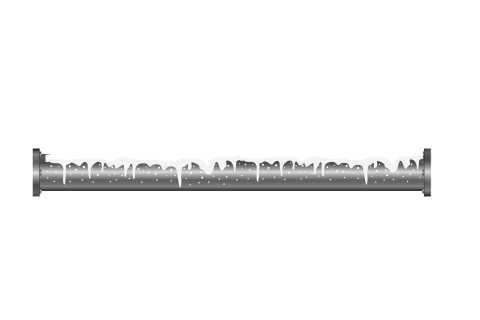A frozen condensate pipe can cause your boiler not to work in freezing temperatures
Your condensing boiler may have stopped working when it freezes, and even the best boilers will not work if you have a frozen condensate pipe which will affect your central heating system.
This is basically a blockage no matter how you look at it, therefore your boiler will start to recognise this and shut down to protect itself before it causes any damage like overheating.
Get new boiler quotes online >

Fortunately, a frozen condensate pipe is not a major problem, it is very common and one of the biggest reasons people call out a heating engineer or install a new boiler when they don’t have to.
Condensing gas boilers are the most common type of boiler in the UK, which require a condensate pipe to work, and as we say, this can be resolved easily without the assistance of an engineer and save you some money along the way.
This page contains all you need to know about how to defrost a frozen condensate pipe quickly and easily to get your boiler back up and running in no time.
Why do condensate pipes freeze?
When Winter gets exceptionally cold outside, it is common to experience a frozen boiler condensate pipe.
When the temperatures drop can lead to the water in the pipes freezing and forming a blockage.
To protect your boiler and home, the boiler will recognise this, stop working, and then lock out to prevent wastewater from accumulating and flooding, which can lead to even more problems and no water coming from your taps.
What to do if you have a frozen condensate pipe

If your condensing boiler has stopped working, then you should check for error codes on your boiler. This may be the quickest solution as they can usually tell you what is wrong. If your boiler error code suggests that the condensate pipe is blocked then follow the advice in this guide.
Initially there you need to defrost the waste water pipe to get your boiler working again, but afterwards, we recommend that the boiler’s hot water temperature is turned up for a while to prevent condensate pipes from freezing.
The boiler will heat up more, which will reduce the condensate buildup and decrease the chance of the pipe freezing.
This does, however, mean that radiators will heat up more, and you’ll pay more for heating, therefore you should remember to adjust the thermostat after it has been extremely cold.
With issues like this, it is always good to have a boiler cover plan to protect you from costly repairs as a result of faults or error codes showing on your old boiler.

How can I tell if my condensate pipe has frozen?
You might hear a gurgling sound from your condensing boiler if part of your condensate pipe freezes and your pipework is located outside.
If this happens, it could also be a sign that your boiler’s digital display has been set to an ‘EA” error code or the common Worcester 227 error code.
For example, if you have a Worcester Bosch boiler, If your condensate pipe becomes frozen, there is no reason to panic. It is possible to safely thaw your condensate pipe without calling an heating engineer or installer.
Where is the condensate pipe?
Condensate pipes run from the boiler to an existing waste pipe system or external drain pipe. It will be located outside your home if connected to an exterior drain pipe.
This pipe can freeze if it is exposed to freezing temperatures for a prolonged period.
Make sure you don’t mistake it for your overflow pipe from your header tank.

How to thaw a frozen boiler condensate pipe
The following steps can quickly restore normalcy to your boiler condensate pipe if you suspect it to have frozen.
Don’t forget. You can contact an expert boiler engineer if you aren’t confident following this guide, they will be able to spot many problems as begin to occur, for example water hammer, or having a frozen condesate pipe and stop them before they ultimately get worse.
- Confirm that the boiler condensate pipe has been frozen ‘fault code or warning light may be displayed on your boiler’s display to indicate a frozen condensate pipe. This depends on the make and type of the boiler. Another sign that the condensate pipe has frozen is the gurgling or bubbling sound from the boiler.
- Find the source of the blockage. The most exposed part of the pipe may be frozen. This could be at the elbow or bend or the open end. You can quickly identify the blockage by running your hands across the plastic pipe until you feel a section colder than the rest.
- To thaw the pipe, use hot water. Use a watering can or jug to pour hot water along the length of the pipe. Continue this process until it thaws ( Do not use boiling water, as this could crack the pipe). If you are using a kettle, let it cool for at least 15 mins after it has been boiled. To slowly defrost the pipe, you can also use a hot water bottle and a heat pack.
- Start your boiler– After the frozen section is melted, clear it. Refer to your boiler manual for detailed instructions on how you can reset the boiler properly. The boiler should now be able to restart.
- Still not working? Try again. Your boiler may not start immediately. However, it may take several attempts to stop the condensate pipe from freezing up again.
Should you use boiler water to thaw a frozen condensate pipe?
No! Avoid pouring boiling water on your condensate pipe, as it can cause cracks.
Only pour hot or warm water on your condensate pipe.
Are you using a kettle? if so, ensure that it has cooled down sufficiently to defrost slowly the pipe or you can also use a hot water bottle and a heat pack.
If you are worried about your condensate pipe freezing every year, speak to your Gas Safe engineer when you get your annual boiler service to have a look at properly lagging your condensate pipe.

How to stop condensate pipes from freezing
Wrap your condensate pipe in old towels immediately if they aren’t already. This will prevent them from freezing again.
You should get to your local DIY shop as soon as possible to purchase foam pipe insulation for wrapping the condensate pipes in.
You can get a variety of sizes of insulation, so make sure to measure the diameter of your pipe before you purchase and even the best insulation might not be sufficient to stop the condensate pipe from freezing in extreme weather conditions.
Temporarily running your boiler while the cold spell continues may be a good idea.
Keep the boiler thermostat at the highest setting possible and if your boiler continues to have problems, you should call a qualified boiler engineer.
